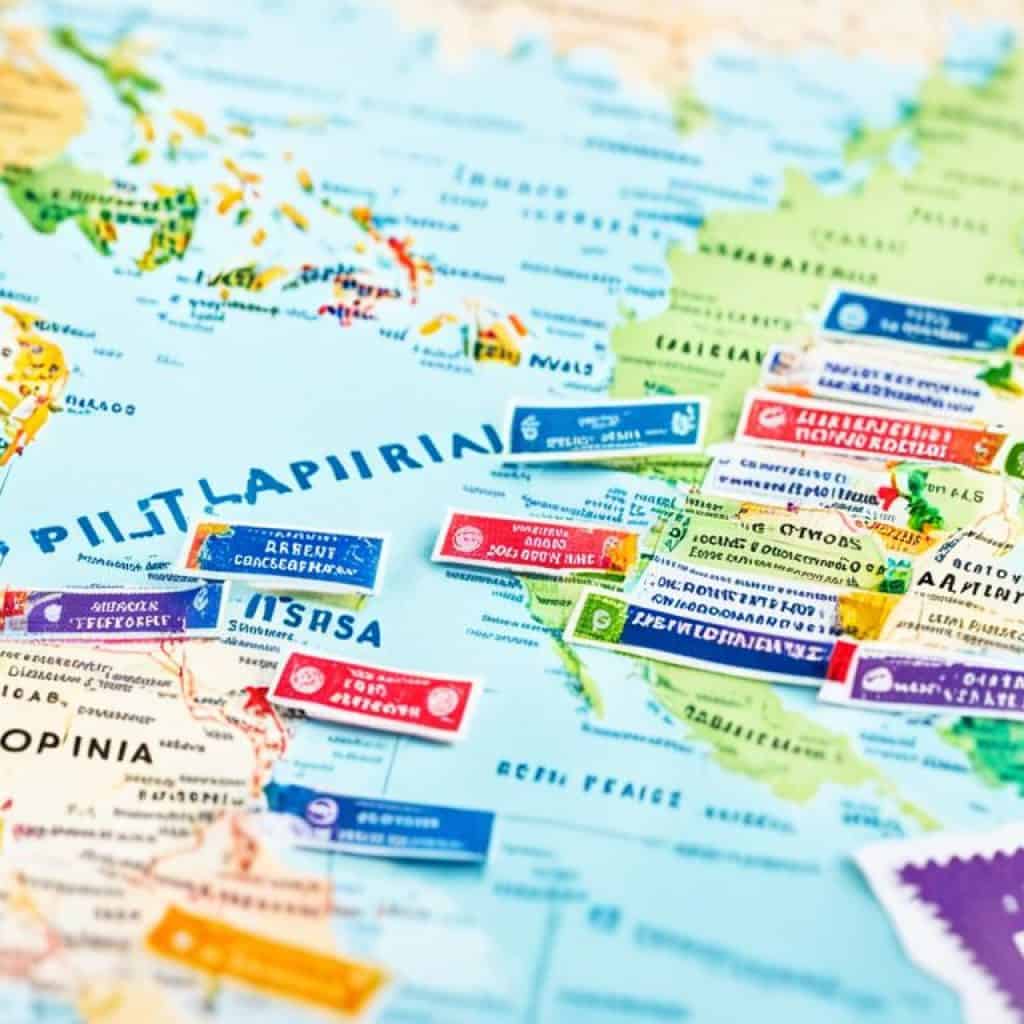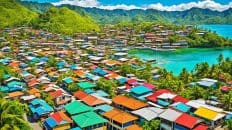Are you ready to embark on an exciting adventure as an expat in the Philippines? Imagine living in a tropical paradise, surrounded by breathtaking landscapes and a vibrant expat community. But is expat life in the Philippines really as idyllic as it seems? What challenges await you? What tips and resources can help you navigate this new chapter of your life? Find out all the answers and more as we delve into the fascinating world of expat living in the Philippines.
Key Takeaways:
- Discover the warm and welcoming Filipino culture that embraces expats.
- Explore the affordable cost of living in the Philippines and how it can enhance your lifestyle.
- Learn about the challenges you might face and how to overcome them with a positive mindset.
- Uncover the secrets to integrating into Filipino society and embracing the local way of life.
- Find out practical tips for finding affordable housing, navigating the food scene, and enjoying cost-effective entertainment options.
The Warm and Welcoming Filipino People
Filipinos are known worldwide for their genuine warmth and hospitality. Expats who choose to live in the Philippines are embraced by a culture that values strong family bonds, community spirit, and a vibrant zest for life. The sense of belonging and the welcoming nature of the Filipino people create a supportive and inclusive expat community.
Making friends and establishing connections is effortless in the Philippines. Filipinos are naturally friendly and approachable, making expats feel right at home. The deep-rooted values of respect, generosity, and compassion are ingrained in the Filipino culture, cultivating an environment of kindness and acceptance. Expats often form lifelong bonds with their Filipino friends, creating a sense of family away from home.
The strong family bonds that Filipinos hold are extended even to expats. Filipino families are close-knit and place a high value on spending quality time together. Expats are often invited to join family gatherings and celebrations, experiencing firsthand the warmth and hospitality of the Filipino culture.
The community spirit in the Philippines is extraordinary. Whether it’s coming together for fiestas, religious events, or simple gatherings with neighbors, Filipinos have a strong sense of togetherness and camaraderie. Expats are welcomed into this community spirit with open arms, allowing them to connect with fellow expats and locals who share similar experiences and interests.
Moreover, Filipinos have a vibrant zest for life that is infectious. The Philippines is known for its festive atmosphere, with colorful celebrations, lively street festivals, and an abundance of cultural activities. Expats have the opportunity to immerse themselves in the rich Filipino culture, participate in local traditions, and truly experience the joy and passion that Filipinos bring to every aspect of life.
Whether it’s exploring the vibrant markets, enjoying delicious street food, or dancing to lively music, expats are captivated by the energy and enthusiasm of the Filipino people. The warmth, friendliness, and genuine hospitality of the Filipino people create an enriching and fulfilling expat experience in the Philippines.
Affordable Cost of Living
One of the major advantages for expats in the Philippines is the remarkably affordable cost of living. Housing, transportation, and basic commodities are considerably cheaper compared to many other countries. Expats can enjoy a comfortable lifestyle without breaking the bank.
When it comes to housing, expats have a range of affordable options to choose from. Whether it’s upscale apartments in metropolitan areas or beachfront properties in idyllic islands, the Philippines offers housing solutions to suit every budget.
The cost of basic commodities in the Philippines is significantly lower compared to many Western countries. From groceries to dining out, expats can enjoy cheaper commodities without compromising on quality.
With the affordable cost of living, expats can lead a comfortable lifestyle in the Philippines. They can enjoy the benefits of a tropical paradise, from beautiful beaches to stunning landscapes, without breaking their budget.
Affordable Cost of Living Comparison Table
| Expense | Philippines | United States | United Kingdom |
|---|---|---|---|
| Housing (Monthly Rent for 1-Bedroom Apartment in City Center) | $300 – $500 | $1,200 – $2,500 | $1,600 – $3,000 |
| Groceries | $100 – $200 | $200 – $400 | $300 – $600 |
| Dining Out (Three-Course Meal for Two at Mid-range Restaurant) | $20 – $30 | $50 – $80 | $60 – $100 |
| Transportation (Monthly Pass) | $20 – $30 | $70 – $100 | $100 – $150 |
In addition to the affordable cost of living, expats often find that they can afford a more luxurious lifestyle in the Philippines compared to their home countries. With their budget stretching further, expats can indulge in experiences like spa treatments, fine dining, and leisure activities without breaking their bank.
The affordability of living in the Philippines makes it an attractive destination for expats seeking a comfortable lifestyle and financial stability.
“Living in the Philippines has allowed me to lead a comfortable lifestyle that I could only dream of in my home country. The low cost of housing and daily expenses has given me the freedom to enjoy a more luxurious lifestyle without straining my finances.”
Challenges of Expat Life in the Philippines
Living as an expat in the Philippines presents its fair share of challenges. However, with a positive mindset and resilience, these obstacles can be overcome.
1. Traffic Jams
The Philippines, particularly cities like Manila, is notorious for heavy traffic congestion. Expats may find themselves spending long hours stuck in traffic, impacting their daily routines and productivity.
2. Skin Tax
Foreigners in the Philippines may encounter discriminatory pricing known as the “skin tax” in some instances. This practice involves charging higher prices to non-Filipinos for certain goods and services, which can be frustrating and unfair.
3. Poverty and Pollution
While the Philippines is a beautiful country, poverty and pollution are prevalent in certain areas. Expats may witness the stark contrast between the country’s natural beauty and the challenges faced by impoverished communities. Pollution can also be an issue in densely populated urban areas, affecting air and water quality.
4. Inefficiency
Inefficiency in public services can sometimes be a source of frustration for expats. Processes that may be straightforward and efficient in their home countries can be more time-consuming and less streamlined in the Philippines. Patience and understanding are key when navigating bureaucracy.
Despite these challenges, expats who embrace the Filipino spirit of resilience and adaptability can find solutions and overcome these hurdles. The warmth and welcoming nature of the Filipino people often help create a support network for expats, and the country’s natural beauty and vibrant culture make it an enticing place to call home.
“The challenges of expat life in the Philippines can be navigated with a positive mindset and an understanding of the local context. By embracing the Filipino spirit, expats can overcome obstacles and truly experience the rewards of living in this tropical paradise.”
Integration and Language
Integrating into Filipino society as an expat is a seamless process thanks to the high English proficiency among the local population. With over 60% of Filipinos speaking English, communication becomes a breeze. The ability to connect with ease facilitates the exploration of the rich Filipino culture and fosters a deep sense of belonging within the expat community.
“The warm hospitality of the Filipino people makes it effortless for expats to feel at home and embrace the local way of life.”
Engaging with the Filipino culture is a gratifying experience that leads to a greater understanding of the country’s traditions and values. Whether it’s immersing oneself in the vibrant festivals, tasting the delectable local cuisine, or participating in community activities, expats find themselves fully integrated into the fabric of Filipino society.
Moreover, the genuine warmth and welcoming nature of the locals create an environment where expats feel comfortable venturing beyond their comfort zones and forming meaningful relationships. The Filipino culture’s emphasis on strong family bonds and community spirit resonates deeply with expats, fostering connections that often last a lifetime.
Embracing the English language and the openness of communication greatly enhances the expat experience in the Philippines, allowing for seamless interaction and integration within the local community.

The seamless integration of expats in the Philippines is aided by the high English proficiency among the population.
Finding Affordable Housing
Finding affordable housing as an expat in the Philippines can be a daunting task. The cost of rent can be high, especially in popular areas. However, by being flexible and considering options like shared housing or living in the outskirts or suburban areas, expats can find more affordable options. It may require adjusting expectations in terms of size, location, and amenities, but there are options available for every budget.
When searching for affordable housing, consider the following:
- Shared Housing: Sharing a rental property with other expats or locals can significantly reduce the cost of rent. This option allows you to split expenses and enjoy a more affordable living situation.
- Outskirts and Suburban Areas: Exploring areas outside of the city center or popular tourist destinations can lead to more affordable housing options. While the commute may be longer, living in the outskirts or suburban areas can provide a quieter and more cost-effective living environment.
Affordable housing in the Philippines may require trade-offs in terms of size, location, and amenities. However, by being open-minded and considering alternative options, expats can find housing that meets their budgetary needs.
Quote:
“By being flexible and considering shared housing or living in the outskirts, expats can find more affordable options.” – Local Filipino Real Estate Agent
Navigating the Food Scene
When living as an expat in the Philippines, food can be a significant expense. However, there are ways to enjoy delicious meals without breaking the bank. By exploring the local cuisine, including street food and dishes sold in local markets, expats can savor authentic flavors while saving money.
One option is to indulge in the vibrant street food culture found throughout the country. From crispy lumpia and tangy adobo skewers to sweet halo-halo desserts, the streets of the Philippines are filled with tantalizing treats at affordable prices. By embracing street food, expats not only save money but also get a chance to experience the local culinary scene.
Another cost-effective option is to visit local markets. These bustling hubs offer a wide array of fresh produce, seafood, and spices. Expats can purchase ingredients to cook their own meals and explore different flavors in the comfort of their own homes. It’s both a money-saving and a culinary adventure.
For those looking to dine out, local restaurants are a great option. Many establishments offer set menus or “combo meals” that provide a variety of dishes at reasonable prices. These meals often come with a main course, rice, and a side dish, satisfying both the palate and the budget. By patronizing local restaurants, expats can support the community while enjoying flavorful and cost-effective meals.
Testimonials from Expats:
“I fell in love with Filipino street food. Not only is it delicious, but it’s also so affordable! I could have a satisfying meal for just a few dollars. It’s a great way to experience local flavors on a budget.” – Maria Escobar, Expat in Manila
“Exploring local markets has been a highlight of my expat experience. It’s not only a chance to find fresh ingredients but also a cultural immersion. I’ve discovered new flavors and learned to cook traditional Filipino dishes, all while saving money.” – David Thompson, Expat in Cebu
“Local restaurants have been my go-to for affordable and delicious meals. The set menus are a great value, and the food never disappoints. Plus, by supporting local businesses, I feel more connected to the community.” – Sarah Chen, Expat in Davao
By embracing the local food scene in the Philippines, expats can enjoy the diverse and flavorful cuisine while keeping their meals cost-effective. Whether it’s indulging in street food, exploring local markets, or dining at local restaurants, there are plenty of options to satisfy both the taste buds and the budget.
Affordable Entertainment Options
When it comes to entertainment, expats in the Philippines have a plethora of affordable options to choose from. The country’s natural beauty is a true treasure, offering stunning beaches and breathtaking mountains that provide endless opportunities for outdoor activities at little to no cost. Whether it’s swimming in crystal-clear waters, hiking through lush rainforests, or simply enjoying a picnic by the beach, expats can immerse themselves in the country’s natural wonders and experience the beauty of the great outdoors.
For those looking for a cultural experience, local museums and art galleries are abundant and often offer free or discounted admission. From contemporary art exhibitions to historical treasures, these cultural institutions provide a window into the rich heritage and artistic expression of the Philippines.
Taking up low-cost hobbies is another great way for expats to enjoy their time in the Philippines without breaking the bank. Whether it’s learning how to cook local dishes, attending local classes or workshops, or even joining community groups for activities like gardening or crafts, there are plenty of options to explore and discover new passions.
Outdoor Activities in the Philippines
The natural beauty of the Philippines provides a stunning backdrop for a wide range of outdoor activities. Expats can bask in the sun on pristine beaches, go snorkeling or diving to explore vibrant coral reefs, or try their hand at surfing in world-renowned surf spots. Adventure enthusiasts can conquer towering mountains and go hiking, trekking, or camping in breathtaking landscapes. From the famous Chocolate Hills in Bohol to the stunning rice terraces of Banaue, there are countless natural wonders to explore and endless adventures awaiting.
Local Museums and Art Galleries
The Philippines has a vibrant arts and culture scene, with numerous museums and art galleries showcasing the country’s rich heritage and contemporary artistry. These cultural institutions not only provide educational experiences but also offer opportunities for expats to immerse themselves in the local art scene. From the National Museum of the Philippines in Manila, featuring an extensive collection of Filipino art and artifacts, to small independent galleries showcasing emerging local talents, there is something to cater to every artistic taste.
Low-Cost Hobbies for Expats
Engaging in low-cost hobbies is a fantastic way for expats to make the most of their time in the Philippines while keeping expenses in check. Embracing the local culture through activities like cooking traditional Filipino dishes can be both enjoyable and budget-friendly. Attending local classes or workshops, whether it’s learning traditional crafts or dance, can also provide a unique way to connect with the local community and learn new skills. Expats can also discover affordable hobbies like photography, hiking, or gardening, which allow them to explore the country’s beauty and spend quality time outdoors.
| Activity | Cost |
|---|---|
| Beach Day | Free |
| Snorkeling | Equipment rental: $10 – $20 |
| Surfing Lesson | $20 – $30 per hour (including board rental) |
| Hiking | Free |
| Local Museum Visit | Free or discounted admission: $1 – $5 |
| Art Gallery Tour | Free or discounted admission: $1 – $5 |
| Cooking Class | $20 – $30 per session |
| Dance Workshop | $10 – $20 per session |
Whether it’s exploring the natural wonders, indulging in the art scene, or engaging in low-cost hobbies, expats in the Philippines can enjoy a fulfilling and affordable lifestyle. The country’s natural beauty, rich cultural heritage, and vibrant community provide endless opportunities for expats to create lasting memories while living on a budget.

Cost-Effective Transportation
Transportation costs can be a concern for expats in the Philippines, but there are plenty of cost-effective options available. By embracing the local modes of public transportation and being aware of the alternatives, expats can save money on transportation expenses.
Public Transportation
One of the most affordable ways to get around in the Philippines is through public transportation. The country offers a variety of options, including jeepneys, tricycles, and buses. These modes of transportation are not only cheaper than taxis or ride-sharing services but also provide a unique experience of local culture and interaction with the Filipino people.
Jeepneys are a popular form of transportation in urban and rural areas. These colorful, modified jeeps can carry multiple passengers and operate on fixed routes. The fare for a jeepney ride is significantly lower than that of a taxi or private car, making it an economical choice for daily commuting.
Tricycles, on the other hand, are a common sight in smaller towns and suburban areas. These motorcycle-powered vehicles with sidecars can transport passengers within short distances. Tricycle fares are often negotiated with the driver, so it’s important to establish the price before the ride. Compared to taxis, tricycles are generally cheaper and offer a convenient way to navigate local neighborhoods.
Renting a Motorbike or Scooter
In areas with less traffic and narrower roads, renting a motorbike or scooter can be a cost-effective and efficient option for expats. This mode of transportation allows greater flexibility and independence, especially for exploring tourist destinations, nearby towns, and off-the-beaten-track locations. Renting a motorbike or scooter is often cheaper than renting a car and offers a thrilling experience of the Philippines’ scenic landscapes.
Embracing the local transportation options is not only a great way to save money but also an opportunity to immerse oneself in the daily lives of Filipinos. Whether it’s hopping on a jeepney, negotiating a tricycle fare, or cruising on a motorbike, these experiences can lead to unforgettable adventures and connections with the vibrant Filipino culture.
Exploring the Philippines on a budget is achievable by utilizing the affordable and accessible modes of public transportation such as jeepneys, tricycles, and buses. Renting a motorbike or scooter can provide flexibility and a thrilling experience of the country’s natural beauty. By being open to these cost-effective transportation options, expats can maximize their savings and fully enjoy their time in this tropical paradise.
Thinking Like a Local to Save Money
When it comes to saving money as an expat in the Philippines, adopting a local mindset is crucial. By embracing the culture and making smart choices, you can live affordably while immersing yourself in the vibrant local community.
Living in Less Touristy Areas
Consider exploring and residing in less touristy areas. These neighborhoods often offer lower rental costs compared to popular tourist destinations. By opting for smaller living spaces in these areas, you can significantly cut down on expenses without sacrificing comfort.
Embracing the Local Culture
Immerse yourself in the rich Filipino culture, including the cuisine and lifestyle. Experimenting with local dishes and shopping at neighborhood markets can be a cost-effective way to enjoy delicious meals and fresh produce. By embracing the local way of life, you can discover affordable and authentic experiences.
Cost-Cutting Strategies
Adopting cost-cutting strategies can help you save money in your daily life as an expat. Consider walking or using public transportation instead of taxis or ride-sharing services. Explore local parks, beaches, and other free or low-cost attractions for entertainment. Taking advantage of these affordable options will not only save you money but also allow you to discover the hidden gems of the Philippines.
“Living like a local in the Philippines not only allows you to save money but also provides a deeper understanding and appreciation for the unique culture and lifestyle of this beautiful country.”
To summarize, thinking like a local is the key to saving money as an expat in the Philippines. By living in less touristy areas, embracing the local culture, and implementing cost-cutting strategies, you can enjoy an affordable lifestyle while fully immersing yourself in the vibrant Filipino community.
Different Expat Visas in the Philippines
The Philippines offers various visa options for expats, depending on their purpose and length of stay. Whether you’re planning to move to the Philippines as a retiree, investor, or spouse of a Filipino citizen, there are specific visas tailored to your needs.
Marriage Visa
A marriage visa, also known as a spousal visa, is available for foreigners married to Filipino citizens. This type of visa allows expats to reside in the Philippines for an extended period. Requirements may include a marriage certificate, proof of financial capability, and a personal appearance at the Philippine Embassy in your home country.
Tourist Visas
Tourist visas are suitable for expats who wish to stay in the Philippines for leisure, exploration, or short-term purposes. The standard tourist visa allows a stay of up to 59 days. However, it can be extended for a maximum of six months or converted to other types of visas, such as work or student visas.
Retirement Visas
The retirement visa, officially known as the Special Resident Retiree’s Visa (SRRV), is designed for expats aged 50 and above who wish to retire in the Philippines. With this visa, retirees can enjoy long-term residency without the need for a specific employment or business. Financial requirements and other supporting documents are necessary to qualify for the retirement visa.
Investor Visa
For expats looking to invest in the Philippines, the investor visa provides an opportunity to stay long-term in the country. This visa is granted to individuals who actively invest in Philippine enterprises, stimulate economic development, and create job opportunities for locals. Guidelines for the investor visa can vary, depending on the nature and scale of the investment.
When considering an expat visa in the Philippines, it is important to consult with the appropriate authorities or seek guidance from immigration lawyers to ensure compliance with all requirements and a smooth application process.

Shipping Personal Belongings to the Philippines
If you’re planning to move to the Philippines, it’s natural to want to bring along your personal belongings. Luckily, there are two options available: sea shipment and air shipment. Both methods have their advantages, and it’s important to consider your needs and budget before making a decision.
Sea Shipment
Sea shipment is a popular choice for international moving to the Philippines due to its cost-effectiveness and ability to transport larger quantities of goods. This method involves packing your belongings into shipping containers, which are loaded onto cargo vessels and transported by sea. The duration of the shipment can vary depending on the origin and destination, but it typically takes several weeks.
When opting for sea shipment, it’s crucial to work with reputable international moving companies that specialize in shipping to the Philippines. These companies can provide you with all the necessary shipping and customs information, ensuring a smooth process from start to finish. They will help you navigate the paperwork and customs requirements, making sure your belongings arrive safely at your new home.
Air Shipment
If you’re looking for a faster shipping option, air shipment may be the ideal choice. While it is generally more expensive than sea shipment, air shipment offers the advantage of quicker delivery times. This method is especially beneficial if you need your belongings to arrive promptly or have a more limited amount of items to transport.
Just like with sea shipment, it’s essential to work with reputable international moving companies that can handle air shipment to the Philippines. They will provide you with the necessary information on packaging requirements and customs regulations specific to air transport. With their expertise, you can ensure a smooth and efficient process for shipping your personal belongings.
Choosing the Right Option
Deciding between sea shipment and air shipment depends on several factors, including the volume of your belongings, your budget, and your timeline. Take the time to evaluate your needs and consider seeking multiple quotes from accredited movers. This will help you find the most cost-effective and reliable option for your international move to the Philippines.
Please note: It’s essential to research and comply with the customs regulations of the Philippines when shipping your personal belongings. Working with professional moving companies will ensure that you have the necessary information and assistance to navigate the customs process successfully.
| Sea Shipment | Air Shipment |
|---|---|
| Cost-effective for larger quantities of goods | Quicker delivery times |
| Longer transit times | Higher cost |
| Work with reputable international moving companies for shipping and customs information | Work with reputable international moving companies for shipping and customs information |
| Perfect for those with a more flexible timeline | Great for those with limited items or urgent shipping needs |
By carefully considering your requirements and working with professional moving companies, you can ensure a smooth and hassle-free experience when shipping your personal belongings to the Philippines. Prepare for your international move with confidence, knowing that your cherished possessions will safely arrive at your new home in this beautiful tropical destination.
Financial Considerations for Expats
Expats living in the Philippines need to carefully consider various financial aspects to ensure a smooth and comfortable lifestyle in this tropical paradise. From creating an expat budget to managing healthcare expenses and understanding local banking practices, being financially prepared is vital for a successful expat experience.
Creating an Expat Budget
One of the first steps for expats is to create a well-planned budget that takes into account the cost of living in the Philippines. This includes expenses such as accommodation, transportation, groceries, utilities, and leisure activities. By setting realistic financial goals and tracking expenses, expats can have better control over their finances and ensure they have sufficient funds to support their desired lifestyle.
Healthcare Considerations
Understanding the healthcare system in the Philippines is crucial for expats. While the country has both public and private healthcare facilities, many expats choose to explore private healthcare options for better quality and faster service. Expats should consider purchasing comprehensive health insurance to cover medical expenses, as well as emergency evacuation coverage if necessary. Researching and selecting healthcare providers that meet individual needs is essential to ensure access to quality medical care.
Banking Practices
Having a reliable bank account in the Philippines is essential for expats to conveniently manage and access their finances. It is advisable to compare different banks and their services, such as online banking, international wire transfers, and ATM accessibility, to find the most suitable option. Understanding local banking practices, including fees for international transactions or currency conversions, can help expats save money and avoid unnecessary charges.
To give you a better idea of the cost of living in the Philippines, here’s a breakdown of some common expenses:
| Expense | Average Cost |
|---|---|
| Accommodation (1-bedroom apartment) | $300 – $800 per month |
| Transportation (monthly pass) | $20 – $65 |
| Groceries (basic items) | $100 – $150 per month |
| Dining out (inexpensive restaurant) | $3 – $6 per meal |
| Utilities (electricity, water, internet) | $50 – $100 per month |
| Healthcare (private health insurance) | $50 – $150 per month |
Keep in mind that these costs can vary depending on the location and individual preferences. It’s always recommended to research specific areas and consult with locals or fellow expats for accurate and up-to-date information.
âHaving a well-planned budget, understanding the healthcare system, and finding a reliable bank are crucial steps for expats to navigate the financial aspects of living in the Philippines.â
By properly managing finances, including budgeting, healthcare considerations, and banking practices, expats can ensure a rewarding and financially secure experience in the Philippines.
Conclusion
In conclusion, expat life in the Philippines offers an extraordinary opportunity to embrace the rich Filipino culture and enjoy the tropical paradise that the country has to offer. With a thriving expat community, expatriates can find a sense of belonging and form lifelong bonds with both locals and fellow expats.
The affordable cost of living in the Philippines allows expats to live comfortably and even enjoy a luxurious lifestyle without breaking the bank. From beautiful beachfront properties to upscale apartments, there are housing options to suit every budget.
Despite the challenges that come with living in a different country, with a positive mindset and a willingness to adapt, expats can navigate through the traffic jams, overcome the “skin tax,” and embrace the local way of life. The high English proficiency among Filipinos makes integration into society relatively easy, facilitating communication and deepening connections.
The Philippines is truly a tropical paradise where expats can bask in the natural beauty of stunning beaches and mountains. The vibrant Filipino culture, warm hospitality, and the opportunity to explore affordable entertainment options make the expat life in the Philippines an enriching and rewarding experience.
FAQ
What makes the Filipino people so welcoming to expats?
The Filipino people are known worldwide for their genuine warmth and hospitality. Expats are embraced by a culture that values strong family bonds, community spirit, and a vibrant zest for life. Making friends and establishing connections is effortless, and expats often form lifelong bonds with their Filipino friends. The sense of belonging and the welcoming nature of the Filipino people create a supportive and inclusive expat community.
Is the cost of living in the Philippines affordable for expats?
Absolutely! One of the major advantages for expats in the Philippines is the remarkably affordable cost of living. Housing, transportation, and basic commodities are considerably cheaper compared to many other countries. Expats can enjoy a comfortable lifestyle without breaking the bank. From upscale apartments in metropolitan areas to beachfront properties in idyllic islands, there are options to suit every budget. Expats often marvel at the luxurious lifestyle they can afford in this tropical haven.
What are some of the challenges of living as an expat in the Philippines?
Like any country, living as an expat in the Philippines comes with its challenges. Heavy traffic, especially in cities like Manila, is a daily struggle. Foreigners may also face discriminatory higher prices, known as the “skin tax.” Poverty and pollution are prevalent in some areas, and inefficient public services can be frustrating. However, with patience and a positive mindset, these challenges can be overcome.
Is it easy for expats to integrate into Filipino society and communicate with locals?
Integrating into Filipino society is relatively easy for expats due to the high English proficiency among the population. With over 60% of Filipinos speaking English, communication is not a major barrier. The rich Filipino culture and the warm hospitality of the locals make it effortless for expats to feel connected and embrace the local way of life.
How can expats find affordable housing in the Philippines?
Finding affordable housing as an expat in the Philippines can be a daunting task. The cost of rent can be high, especially in popular areas. However, by being flexible and considering options like shared housing or living in the outskirts or suburban areas, expats can find more affordable options. It may require adjusting expectations in terms of size, location, and amenities, but there are options available for every budget.
How can expats save money on food in the Philippines?
Food is a major expense for expats, but there are ways to save money without sacrificing taste and experience. Embracing the local cuisine, including street food and dishes sold in local markets, can be a cost-effective option. Local restaurants that offer set menus or “combo meals” are also a great value. By immersing in the local food scene, expats can enjoy delicious meals at affordable prices.
What are some affordable entertainment options for expats in the Philippines?
The Philippines offers a wealth of affordable entertainment options for expats. The natural beauty of the country, including stunning beaches and breathtaking mountains, provides endless opportunities for outdoor activities at little to no cost. Local museums and art galleries often offer free or discounted admission for cultural exploration. Taking up low-cost hobbies, such as cooking local dishes or attending local classes, can also be a fun and affordable way to enjoy the expat life.
How can expats save money on transportation in the Philippines?
Transportation costs can add up for expats, but there are cost-effective options available in the Philippines. Public transportation, such as jeepneys and tricycles, are cheaper alternatives to taxis or ride-sharing services. Renting a motorbike or scooter can also be a cost-effective way to get around, especially in smaller towns or suburban areas. By being aware of the local transportation options and embracing the local way of getting around, expats can save money on transportation expenses.
What are some tips for saving money as an expat in the Philippines?
Thinking like a local is a key strategy for saving money as an expat in the Philippines. This includes being open to living in less touristy areas or opting for smaller living spaces, which can significantly reduce rental costs. Embracing the local culture, including the cuisine and lifestyle, can also lead to more affordable living. Choosing to live in less touristy areas can often provide a more authentic experience and lower costs, allowing expats to save money and fully immerse themselves in the local community.
What types of expat visas are available in the Philippines?
The Philippines offers various visa options for expats, depending on their purpose and length of stay. These include marriage visas for those married to Filipino citizens, tourist visas that can be extended for up to 3 years, retirement visas for expats over 50 years old, and investor visas for those who want to invest in the country. Each visa has its requirements and benefits, and expats must consult with the appropriate authorities to determine the best option for their specific situation.
How can expats ship their personal belongings to the Philippines?
If expats plan to bring their personal belongings to the Philippines, they have the option to use sea or air shipment. It is essential to work with reputable international moving companies that can provide the necessary shipping and customs information to ensure a smooth process. Seeking multiple quotes from accredited movers can help expats find the most cost-effective and reliable option for their needs.
What financial considerations should expats keep in mind while living in the Philippines?
Expats in the Philippines need to consider various financial aspects, including budgeting, healthcare, and banking. Creating an expat budget to manage expenses and ensure a comfortable lifestyle is essential. Understanding the healthcare system and exploring private healthcare options is also crucial for expats. Finding a reliable bank and understanding the local banking practices can help expats manage their finances effectively while living in the Philippines.


















Add comment